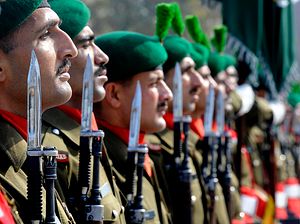On September 15, U.S. Senator Bob Corker referred to Pakistan as a “duplicitous partner” in the region, as Pakistan continues to support terrorist groups, including the Haqqani Network, that work against U.S. and Afghan interests.
The remarks by the senator come as the U.S. blocked sales of F-16 fighter jets and $300 million in aid marked to support allies in the fight against terror, when U.S. Secretary of Defense Ashton Carter refused to testify that Pakistan had been doing enough to pressure the Haqqani Network, a U.S.-designated terrorist group.
Following the attacks in Uri, Kashmir that killed 17 Indian soldiers, two U.S. lawmakers, Congressman Ted Poe of Texas, who serves as chairman of the House Subcommittee on Terrorism, and Congressman Dana Rohrabacher of California introduced the Pakistan State Sponsor of Terrorism Designation Act. The bill, H.R 6069, would require the White House to make a formal designation of Pakistan within a four month time frame.
“It is time we stopped paying Pakistan for its betrayal and designate it for what it is: a state sponsor of terrorism,” Poe said in announcing the bill. “Not only is Pakistan an untrustworthy ally, Islamabad has also aided and abetted enemies of the United States for years. From harboring Osama bin Laden to its cozy relationship with the Haqqani Network, there is more than enough evidence to determine whose side Pakistan is on in the war on terror. And it’s not America’s.”
Moreover, at a news conference on Friday, General John Nicholson, the U.S. commander of Operation Resolute Support stated that Pakistan had not been placing “adequate pressure” on the Haqqani Network.
“The Haqqanis operationally have been able to continue to conduct operations inside Afghanistan. They constitute the primary threat to Americans, to coalition members and to Afghans, especially in and around Kabul,” he added.
In an interview with NDTV, Afghanistan’s ambassador to India, Dr. Shaida Mohammad Abdali, hinted that Afghanistan, India, and Bangladesh may boycott the coming South Asian Association of Regional Cooperation (SAARC), set to be held in Islamabad in November.
“We have to make sure that we bring the maximum number of countries and I am sure most South Asian countries are in line with what we think. Therefore, the effort should be comprehensive and we should single out a country that spoils our unity and regional peace,” the ambassador said.
On Thursday, China began to walk back assertions by Pakistani media that it had supported Pakistan’s position on Kashmir.
“Premier Li Keqiang of the State Council met with Pakistani Prime Minister Nawaz Sharif on September 21 in New York. They exchanged views on bilateral relations as well as international and regional issues of common interest,” Chinese Foreign Ministry Spokesman Lu Kang said.
“The issue of Kashmir is an issue leftover from history. Our stance on that is consistent. We hope that parties concerned will pursue a peaceful settlement through dialogue,” he added.
Li was quoted by Pakistan’s Dawn News as saying, “We support Pakistan and we will speak for Pakistan at every forum,” while discussing the matter with Sharif on the sidelines at the UN General Assembly in New York.
The comments by the Chinese Foreign Ministry spokesman come as China has already hinted at delays in the construction of the China-Pakistan Economic Corridor (CPEC), a major infrastructure project designed to link China to the Gwadar port in Pakistan, over concerns related to security. Portions of the CPEC route run through what India describes as Pakistan occupied Kashmir (PoK).
When pressed on the safety of Chinese workers working on the CPEC project, Lu stated, “We hope that parties concerned will exercise restraint, peacefully resolve difference through dialogue, avoid escalating tension, and work jointly for peace and stability of the region.”
Relations between Islamabad and the United States have appeared to boil over as Afghanistan finds itself once again embroiled in another bloody fighting season intensified by Pakistan’s support of proxy agents in the war torn region. Frustrated by Pakistan’s efforts to curtail its support of terror groups in Afghanistan, the U.S. has supported Afghanistan’s pivot to India as a bulwark against Pakistani interference in its internal affairs.
The rising trilateral relationship with New Delhi and further sidelining of Pakistan is likely to be met with scorn by Pakistan and further bloodshed in Kabul.

































